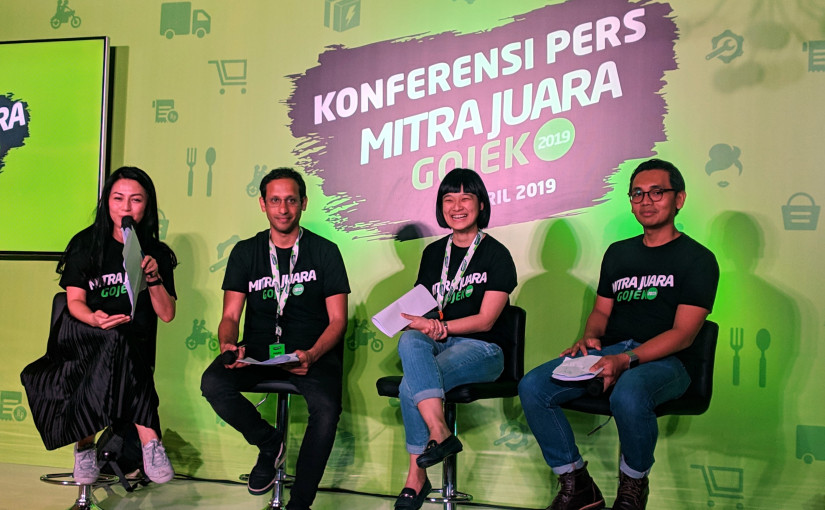Gojek’s Founder and CEO, Nadiem Makariem said the gross transaction value (GTV) has increased by 13.5 times up from 2016 to 2018. In terms of nominal, it has exceeded $9 billion (around Rp127 trillion) in 2018 and reached two billion transaction a year in total.
Gojek has now acquired 1.7 million drivers, around 400 merchants, and more than 60 thousand service providers in Southeast Asia. The app has been downloaded over 142 million times.
According to the three researches Makariem has mentioned, the Financial Times Confidential (2018), DailySocial and Jakpat (2018), and YouGov (2019), the entire report stated Go-Pay as the number one payment method in Indonesia.
“9 billion dollar for gross transaction has outperformed the competitor, although we just started expanding abroad. [..] Go-Pay, according to the three research institution, is top of the list. Soory to clarify, what really matter is the impact. A real work rather than show off,” he said yesterday (4/11).
Two of Gojek’s main businesses, Go-Food and Go-Pay performance are also revealed. Go-Food is the largest service in Southeast Asia and at the third position in the world.
Go-Food’s Chief Commercial Expansion, Catherine Hindra Sutjahyo said, Go-Food has win over Go-Ride as transportation service. Go-Food is said to develop four times bigger than GrabFood.
The number of its order has reached 30 million per month in Southeast Asia, increased by 7 times from December 2016 to December 2018. 80% of Go-Food’s orders aren’t coming of big merchants, but SMEs. Delivery time in average is 27 minutes.
“Go-Food Merchants has reached more than 300 thousand, 125 thousand in April last year. It’s countable, the monthly growth,” she said.
Aldi Haryopratomo, Go-Pay’s CEO added, since walking out from Go-Jek’s ecosystem, the rate has gone up 25 times since the first time it was introduced. It encourages Go-Pay as the most popular e-money service in Indonesia according to three different research institutions.
Go-Pay is now partnered up with 28 financial institutions, accepted by more than hundred thousands merchants in 370 cities in Indonesia.Go-Pay infrastructure is supported by various services, including Spots – an online multifuction cashier app.
Spots can receive Go-Food’s orders, Go-Pay’s payment, print the bill, and create daily report of various kinds of payment methods. Midtrans payment gateway also support online merchants to receive payment from many kinds of financial institutions.
Declare an “open war”
Makariem implisitly quipped, and questioned Grab’s claim of many issues. For example, Grab‘s market penetration in Indonesia, and super app.
He claims Gojek as the first super app in the world. Not only one app, there are three apps has been developed. Those are Gojek end user app for transaction, Go-Biz (rebranding from Go-Resto) for SMEs merchants, and Gojek Driver for the drivers.
“We have the first super app in the world consists of big pillars, each to be explored further. Those are human transportation, logistics, payment, and fintech.”
These pillars, he added, are proof that local concept can gain benefit, not only Indonesia, but also for all around Southeast Asia. Whereas, Gojek has just ‘got out of the cage‘.
He also mentioned, the war is started from the time Gojek received US$2 million funding, while Grab has reached US$250 million. Gojek is considered as the main power due to understanding of user’s demand and aware of consumer’s opinion.
“Therefore, being the largest is important, but not the priority. What matter most is Gojek’s real impact to public. Win over Indonesia, in Southeast Asia. [..] We’re glad to accept new challenge [from Grab] that is why we always create new innovations everyday,” he added.
Another advantage is, Gojek started from two-wheeler transportation, which creates efficiency. Drivers can work all day long, picking up people, delivering package and food, also offering Go-Pay top up. He said driver’s income has outrun Grab’s.
Support from investors are essential. He claimed, everytime they did fundraising, it always going well, effective, and successful. The investors are also diversed of various classes.
Regarding decacorn status, Makariem argued that valuation is not for public information due to company’s culture.
“Our culture is not to celebrate ourselves. Let people celebrate. Valuation is important, but not everyting. What matter the most is the numbers, the impact to the country we are proud of, Indonesia,” he said.
–
Original article is in Indonesian, translated by Kristin Siagian
